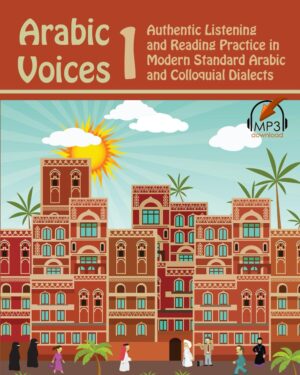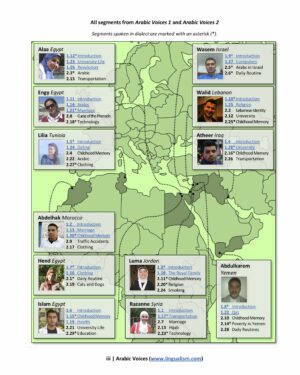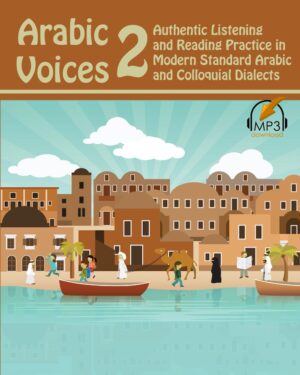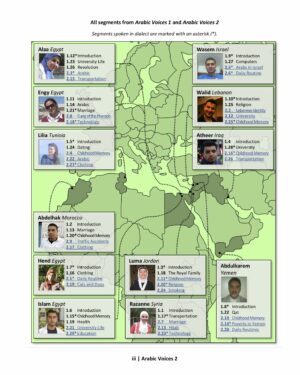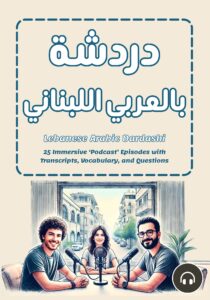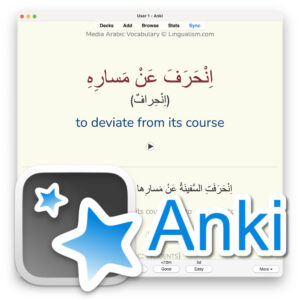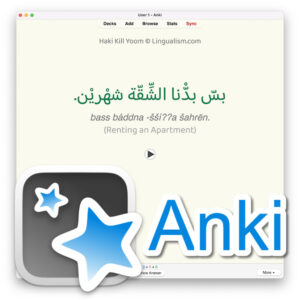Home » Modern Standard Arabic » Childhood Memory–Abdulkarem
Childhood Memory–Abdulkarem
| Peace, mercy and blessings of God, [00:00.2] | السلام عليكم ورحمة الله وبركاته، | |
| Hello and welcome to a new Arabic Voices video. [00:03.2] | أهلًا ومرحبًا بكم في فيديو جديد من فيديوهات Arabic Voices. | |
| Today we will talk about what Abdulkarem said about his childhood and his childhood memories. [00:07.2] | اليوم سنتحدّث عمّا قاله عبد الكريم بشأن طفولته وذكراه في طفولته. | |
| And we begin on page 54, where Abdulkarem begins his talk by saying, "In the name of God, the Most Gracious, the Most Merciful," which is what we know as the 'basmalah.' [00:13.6] | ونبدأ في الصفحة الرابعة والخمسون، حيث يبدأ عبد الكريم حديثه بقوله: (بسم الله الرحمن الرحيم)، وهو ما نعرفه [بالبسملة]. | |
| Often people in the Arab world, especially Muslims among them, begin to… in… by saying, "In the name of God, the Most Gracious, the Most Merciful." It is an opening for speech. [00:25.2] | وكثير ما يبدأ الأشخاص في الوطن العربي، خاصةً المسلمون منهم بح… في… بقولهم (بسم الله الرحمن الرحيم) فهو افتتاح للكلام. | |
| And sometimes they conclude what they're saying with "Praise be to God, Lord of the Worlds" or "Praise be to God." [00:38.5] | وأحيانًا يختتمون كلامهم بـ(الحمد لله رب العالمين) أو [الحمد]. | |
| They begin with bismillah and end with 'praise.' This is a cultural gesture about Arab societies, especially Muslims. [00:44.0] | فيبدأون [بالبسملة] وينتهون بـ[الحمد]؛ هذه لفتة ثقافية عن المجتمعات العربية وخاصةً المسلمون منهم. | |
| After that, we move to line 3, where Abdulkarem says, "Childhood... Childhood for every human being is the happy period in which there is no reckoning or punishment." [00:56.3] | بعد ذلك ننتقل إلى السطر الثالث، حيث يقول عبد الكريم: (الطفولة… الطفولة لكل إنسان هي الفترة السعيدة التي ليس فيها حساب ولا عقاب). | |
| He uses two words here, and he considers… These two words are a term, we use these two words together often حساب (reckoning) and عقاب (punishment). [01:09.3] | ويستخدم كلمتين هنا، ويعتبر… تعتبر هاتين الكلمتين مصطلح، نستخدم هاتين الكلمتين معًا كثيرًا [حساب وعقاب]. | |
| You say, for example, "Corruption has spread in this country without accountability or punishment," meaning that there is… that there is no accountability, there is no punishment. You say, "there is neither account nor punishment." [01:22.6] | تقول مثلًا: (أن الفساد قد انتشر في هذا البلد بلا حسابٍ ولا عقاب)، أي أن هناك… أنه ليس هناك مسائلة، ليس هناك عقاب، تقول (ليس هناك حساب ولا عقاب). | |
| The happy period in which there is no reckoning or punishment," meaning there is no responsibility, and we often use these two words together. [01:35.4] | (الفترة السعيدة التي ليس فيها حساب ولا عقاب) أي ليس فيها مسئولية، وغالبًا ما نستخدم هاتين الكلمتين معًا. | |
| Then we move on to line 4. Abdulkarem says, "There are some situations that cannot be erased from a person's memory, no matter how old he is." [01:45.7] | ننتقل بعد ذلك إلى السطر الرابع—يقول عبد الكريم: (هناك بعض المواقف التي لا يمكن أن تُمحى من ذاكرة الإنسان مهما بلغ من العمر). | |
| And here Abdulkarem uses the conditional مهما (whatever), and this word we use with two verbs one depends on the other, [01:56.8] | وهنا يستخدم عبد الكريم اسم الشرط [مهما]، وهذه الكلمة نستخدمها مع فعلين يعتمد أحدهما على الآخر، | |
| You say, for example, "I will not get angry no matter what I do." You do what you do, but I will not get angry. "I will not get angry no matter what I do, he will not listen to advice no matter how hard you try," and so on. [02:07.9] | تقول مثلًا: (أنا لن أغضب مهما فعلت)، فأنت تفعل ما تفعل ولكني لن أغضب، (أنا لن أغضب مهما فعلت، هو لن يستمع إلى النصيحة مهما حاولت)، وهكذا. | |
| Sometimes we use one of the two verbs in the negative, as you saw. He will not listen to advice no matter how hard you try; you try and you try and you try, but he will not benefit from your advice; he will not listen to your advice. [02:25.8] | أحيانًا نستخدم أحد الفعلين في النفي، كما رأيت هو لن يستمع إلى النصيحة مهما حاولت فأنت تحاول وتحاول وتحاول ولكنه لن يستفيد من نصيحتك، لن يستمع إلى نصيحتك. | |
| As Abdulkarem says here, "Some situations that cannot be erased from a person's memory, no matter how old he is," whatever his age. [02:41.9] | كما يقول عبد الكريم هنا: (بعض المواقف التي لا يمكن أن تُمحى من ذاكرة الإنسان مهما بلغ من العمر) أي أيًا ما كان عمره. | |
| After that, we move to line 6, and here we see a slip of the dialect. While talking, Abdulkarem says, "when إحنا we were children, we used to..." [02:54.3] | بعد ذلك ننتقل إلى السطر السادس—وهنا نرى زلة من زلات اللهجة—أثناء حديثه يقول عبد الكريم: (تعوّدنا وإحنا أطفال صغار). | |
| And as you know, إحنا (we) is from the colloquial dialect, whether in the Yemeni colloquial or in the Egyptian colloquial, but it is correct as you know in the classical Arabic language to say, "when نحن we were children, we used to..." [03:10.0] | وكما تعلم [إحنا] هي من اللهجة العامية سواء في العامية اليمنية أو في العامية المصرية، ولكن الصحيح كما تعرف في اللغة العربية الفصحى أن تقول: (ونحن تعوّدنا ونحن أطفال صغار). | |
| After that, on line 9, Abdulkarem says, "And we used to run after him from street to street until he went outside the city." [03:26.4] | بعد ذلك في السطر التاسع—يقول عبد الكريم: (وكنا نجري وراءه من شارعٍ إلى شارع حتى خرج إلى خارج المدينة). | |
| And here Abd al-Karim uses من (from) and إلى (to). "from street to street until he went outside the city," and this means that they have entered many streets. [03:38.4] | وهنا يستخدم عبد الكريم [من، إلى] (من شارع إلى شارع حتى خرج إلى خارج المدينة)، وهذا يعني أنهم قد دخلوا في شوارع كثيرة. | |
| And when using this form 'from somewhere, to somewhere' it may mean this repetition, especially if you follow it 'up to'... especially if you follow it 'up to', so the formula is 'from, to, until.' [03:53.1] | وعند استخدام هذه الصيغة [من مكانٍ ما، إلى مكانٍ ما] قد تعني هذه التكرار، خاصةً إذا لحقتها [بحتى]… خاصةً إذا لحقتها [بحتى]، فتكون الصيغة [من، إلى، حتى]. | |
| from street to street until he got out of the city" meaning that they went in… maybe more than five or six streets, not just two streets. [04:12.1] | (من شارعٍ إلى شارع حتى خرج إلى خارج المدينة) أي أنهم ذهبوا في… ربما أكثر من خمس شوارع أو ست شوارع وليس شارعين فقط. | |
| You can say, for example, "I moved from Arab country to Arab country until I mastered the Arabic language," and this means that you did not travel only two countries, but you traveled many countries until you learned the Arabic language 'from, to, until.' [04:22.8] | يمكنك أن تقول مثلًا: (انتقلت من بلدٍ عربي إلى بلدٍ عربي حتى أتقنت اللغة العربية) وهذا يعني أنك لم تسافر بلدين فقط، بل أنت سافرت بلدان كثيرة حتى تعلمت اللغة العربية [من، إلى، حتى]. | |
| Great! We then move on to line 12, where Abdulkarem says, "As the people used to perform the noon prayer, the prayer would be performed and all the children would return to their homes for lunch." [04:40.9] | عظيم! ننتقل بعد ذلك إلى السطر الثاني عشر، حيث يقول عبد الكريم: (حيث أن الناس تعوّدوا في صلاة الظهر، أن يتم أداء الصلاة ويعود جميع الأبناء إلى بيوتهم لتناول الغداء). | |
| Abdulkarem says here, "Get used to the noon prayer that the prayer is performed." [04:59.3] | يقول عبد الكريم هنا (تعوّدوا في صلاة الظهر أن يتم أداء الصلاة)، | |
| And with the verb, 'to get used to,' you use أن (that). You say, for example, "I used to say good, or I used to help my friends," and thus you use أن with the verb تعوّد (to get used to). [05:06.1] | ومع الفعل [تعوّد] تستخدم [أن] تقول مثلًا: (أنا تعوّدت أن أقول الخير، أو أنا تعوّدت أن أساعد أصدقائي)، وهكذا فتستخدم [أن] مع الفعل [تعوّد]. | |
| You can also use على. "I used to do something, I used to do good." [05:21.7] | كما يمكنك كذلك أن تستخدم [على]، (تعوّدت على فعل شيءٍ ما، أنا تعوّدت على فعل الخير). | |
| And as you can see here I use the masdar after أن. 'I used to do good, I used to do good.' Both are correct. "I used to help my friends, or I used to help my friends." [05:29.9] | وكما ترى هنا أستخدم [المصدر] بعد [على]، (تعوّدت على فعل الخير، تعوّدت أن أفعل الخير)، كلاهما صحيح، (تعوّدت أن أساعد أصدقائي، أو تعوّدت على مساعدة أصدقائي). | |
| Then we move on to line 12, and in this regard Abdulkarem says, "My older sister tried to stand with me, so I went down to the door and opened the door for me." [05:47.8] | ننتقل بعد ذلك إلى السطر العشرين، وفي هذا الصدد يقول عبد الكريم: (وحاولت أختي الكبرى أن تقف معي، فنزلت إلى الباب وفتحت ليّ الباب). | |
| As you can see here, a word or verb يقف (to stand), تقف معي (stand with me) meaning help. That is, his older sister tried to help him, so I went down to the door. [06:01.5] | وكما ترى هنا كلمة أو فعل [يقف، وتقف معي] بمعنى المساعدة، أي حاولت أخته الكبرى أن تساعده، فنزلت إلى الباب. | |
| You can say 'standing… so-and-so stands with so-and-so' in the sense of helping him. You can say, "I stand with my friends in distress, or I stand next to my friends in distress," about … You can say يقف مع (standing with) or يقف بجانب (standing beside) meaning يساعد (helps). [06:13.2] | يمكنك أن تقول (تقف… يقف فلان مع فلان) بمعنى يساعده، فيمكنك أن تقول (أنا أقف مع أصدقائي عند الضيق، أو أنا أقف بجانب أصدقائي عند الضيق)، عن… يمكنك أن تقول [يقف مع] أو [يقف بجانب] بمعنى [يساعد]. | |
| Great! We then move to line 23, where Abdulkarem says, "My mother beat me for being late, even though she had punished me by not opening the door, because she also beat me." [06:34.5] | عظيم! ننتقل بعد ذلك إلى السطر الثالث والعشرون، حيث يقول عبد الكريم: (ضربتني والدتي لتأخري بالرغم أنها قد عاقبتني بعدم فتح الباب، لأنها أيضًا قامت بضربي). | |
| Here, Abdulkarem uses the word بالرغم أن (although), and this is a word that you can use to connect two verbs, one logically contradicting the other...one logically contradicting the other. [06:50.6] | وهنا يستخدم عبد الكريم كلمة [بالرغم أن]، و[بالرغم أن] هي كلمة يمكنك أن تستخدمها للربط بين فعلين، أحدهما يناقض الآخر منطقيًا… أحدهما يناقض الآخر منطقيًا. | |
| You can say, for example, “I gave him money even though he didn’t need it.” He doesn’t need the money, but I gave him the money anyway, and that… Giving him money even though he doesn’t need it is logically contradictory to him, but I did it. [07:07.5] | يمكنك أن تقول مثلًا: (أنا أعطيته المال بالرغم أنه لا يحتاجه)، فهو لا يحتاج المال، ولكني أعطيته المال على أية حال، وهذا… إعطاء المال له بالرغم أنه لا يحتاجه، يتناقض منطقيًا معه، ولكنني ولكنني قد فعلته. | |
| As Abdulkarem says here, "She hit him even though she had punished him in the beginning." [07:28.1] | كما يقول عبد الكريم هنا: (هي ضربته بالرغم أنها قد عاقبته في البداية). | |
| You can also say على الرغم من (although) instead of بالرغم (in spite of), you can say على الرغم من (although). [07:36.8] | يمكنك كذلك أن تقول [على الرغم من] بدلًا من [بالرغم]، يمكنك أن تقول [على الرغم من]. | |
| You can say here, "My mother beat me for being late even though she punished me for not opening the door because she too beat me." [07:44.6] | فيمكنك أن تقول هنا (ضربتني والدتي لتأخري على الرغم من أنها قد عاقبتني بعدم فتح الباب لأنها أيضًا قامت بضربي). | |
| You can say, "I gave him the money even though he doesn't need it." [07:57.5] | يمكنك أن تقول (أنا أعطيته المال على الرغم من أنه لا يحتاجه). | |
| بالرغم أن (although) or على الرغم أن (although) both are true. [08:04.4] | [بالرغم أن] أو [على الرغم أن] كلاهما صحيح. | |
| Finally, we move to line 27, where he says... where Abdulkarem says, "So that I cannot be absent from home at these times, and thank you." [08:12.1] | وأخيرًا ننتقل إلى السطر السابع والعشرون، حيث يقول… حيث يقول عبد الكريم: (بحيث أنني لا يمكن أن أغيب على المنزل في هذه الأوقات، وشكرا). | |
| Abdulkarem here uses the form لا يمكن أن (cannot), you can use the form 'nothing can happen' to say that it is impossible to happen. [08:26.7] | يستخدم عبد الكريم هنا صيغة [لا يمكن أن]، يمكنك أن تستخدم صيغة (لا يمكن لشيء ما أن يحدث) للقول بأنه يستحيل أن يحدث. | |
| For example, you can say, "You cannot enter without a permit, you cannot travel without a visa," and so on. [08:40.1] | فيمكنك أن تقول مثلًا: (لا يمكنك أن تدخل بغير تصريح، لا يمكنك أن تسافر بغير تأشيرة)، وهكذا. | |
| When using لا يمكن (cannot), you can use either the responsible source or the explicit source, both of which are true. [08:50.6] | وعند استخدام [لا يمكن]، يمكنك أن تستخدم المصدر المؤول أو المصدر الصريح، كلاهما صحيح. | |
| You can say, "you can't travel without a visa, or you can't travel without a visa," both are correct. [08:59.6] | فيمكنك أن تقول (لا يمكنك أن تسافر بغير تأشيرة، أو لا يمكنك السفر بغير تأشيرة)، كلاهما صحيح. | |
| You can use لا يمكن (can’t) to… with the responsible source or the explicit source, both are correct. [09:09.8] | فيمكنك أن تستخدم [لا يمكن] في… مع المصدر المؤول أو المصدر الصريح، كلاهما صحيح. | |
| With this, we have finished commenting on what Abdulkarem said about his childhood, and commenting on this funny story that I personally enjoyed. [09:19.2] | وبهذا نكون قد انتهينا من التعليق عمّا قاله عبد الكريم بشأن طفولته، ومن التعليق على هذه القصة الطريفة التي قد استمتعت بها شخصيًا. | |
| I hope you have benefited from this video. [09:33.3] | أتمنى أن تكونوا قد استفدتم من هذا الفيديو. | |
| Thank you very much, and good luck. [09:35.9] | أشكركم شكرًا جزيلًا، وألقاكم على خير. | |
| Peace, mercy and blessings of God. [09:38.7] | السلام عليكم ورحمة الله وبركاته. |
Video Lessons
Arabic Voices MSA Lessons
Arabic teacher Mostafa Ahmed takes us through segments in MSA from Lingualism's book Arabic Voices 1: Authentic Listening and Reading Practice in Modern Standard Arabic and Colloquial Dialects, explaining interesting points of grammar and vocabulary.

